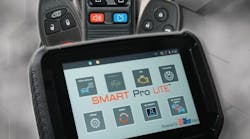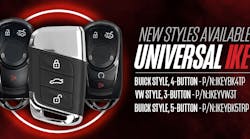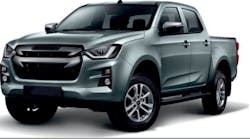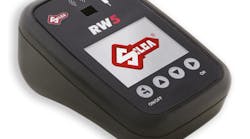The May 15 Locksmith Live webinar session featured a discussion about getting into the high-tech specialty of automotive locksmithing. Wayne Winton hosted this free online discussion featuring Jareth Garza, the force behind The Locksmith Academy, and UHS Hardware’s Tirso Navarro. The panel and some of the attending locksmiths had some interesting discussions and asked and answered some thought-provoking questions.
Watch this webinar here: https://www.youtube.com/watch?v=2nzA--NcL4Y
The Locksmith Academy is a comprehensive online automotive training school, featuring footage of real, in-the-field jobs, including troubleshooting when things don’t go as planned. For more information, go to www.thelocksmithacademy.com.
The first topic was the influx of non-OEM remotes on the market and the locksmiths’ ability to combine elements from different transponders to craft a working one. This translates to significant savings on the inventory they must stock. Garza calls this “transponder adaptability.” The following Q&A is from the webinar discussion hosted by Winton and featuring Garza:
What is a transponder key and what are some of the different types of keys that are out there?
Some transponder key basics were addressed. Transponder keys are predominantly used today, though some older vehicles still use non-transponder car keys. Transponder keys transmit a signal and the car will respond with its own signal, which is basically like electromagnetism. The car stores a code inside the ECU and that controls start/stop authorization. Whenever a key is inserted into the ignition, the car reads it, and it transmits a signal and the key responds. It asks, ‘do I know you?’ and the key holds a string of key seed data and it says, ‘yes I'm Jeff’ and if Jeff is currently logged inside of the car’s ECU or immobilizer, the car will give start authorization, fuel will flow and the car will start.
This started in Europe because of car thefts. A lot of new key systems will start in Europe and then move to America.
What equipment is needed to get started?
If somebody was brand new, I would tell them to buy an Autel programmer and then to buy an XHorse Key Tool Max, which enables them to adapt transponder key, read keys, test batteries and do a lot of troubleshooting. Also, buy Original Lishi picks, the GTL build-a-key kit and lots of superchips.
Auto Smart by Michael Hyde is a great reference and he broke it down initially as foreign and domestic. Nowadays, it's more evolved; it's domestic, BMW/ Mercedes, Volkswagen/Audi and then Asian, so the automotive locksmith would need multiple programmers. It is a big misconception that any one programmer does all the cars.
Which vehicles to program is a related consideration. New locksmiths will be confronted with challenges such as EEPROM transponder technology. One big thing that a new guy should always consider is taking on all cars versus domestic or Asian imports.
How do you determine what key to use for European and Japanese cars? Does UHS carry such transponders?
Most automotive distributors carry all of what you need. The best way to look up a vehicle's keyway is Auto Smart. You can also go to www.uhs-hardware.com and enter year, make and model. You can use distributors as a point of research.
Do you program keys supplied by the customer? What warranty is offered?
Yes, if you don't cut those keys somebody else will, so you should figure out your pricing. No warranty; it’s not your product. And always tell the customer up front that they will need to pay for the job even if the key they furnished does not work.
The question about warranties on such keys generated a great comparison. Today’s remotes are basically smartphones, and just like those phones, they can be dropped, submerged and otherwise mishandled and damaged. The recommendation: warranty coverage ends when the customer leaves with the remote.
When you're talking to the customer, do you ever ask was this vehicle worked on before by another locksmith?
It’s possible the car was impounded or towed or bought used from an auction or dealer who worked on the car. There could be a potential problem just based on the car’s history. And some customers will get the information wrong or even lie or exaggerate in hopes of saving some money.
Some locksmith detective work may be in order. Look at a vehicle's brake rotors to see how long it's been sitting because the amount of surface rust on brake rotors is indicative of how long it sat without moving. Also check the battery voltage.
The locksmiths advised inspecting vehicles to be sure they are in working condition before starting work and then recording and documenting the job to guard against future damage and liability claims.
When do you turn down or walk away from a job?
The easy answer might be “as soon as it’s no longer profitable,” meaning don’t put in a full day’s work trying to solve problems on a job quoted at $200, missing out on other jobs that would generate more income. The hard answer involves pride in one’s work and working through a tough problem to find a solution.
Some folks predict that keys are going away. That may be the case with newer, push-to-start vehicles, but automotive work is not going away. It’s evolving into a lucrative, challenging market, ideal for tech-savvy technicians. Continued training is essential to succeed and there are plenty of good sources out there, including the Locksmith Academy, ALOA’s automotive division (hosting its first event this fall), and many distributors and manufacturers.
For more information:
- The Locksmith Academy: www.thelocksmithacademny.com
- UHS Hardware Training: www.uhs-hardware.com
- Locksmith Nation Facebook group: https://www.facebook.com/groups/LocksmithNation
- Wayne’s Lockshop training videos: www.wayneslockshop.com






